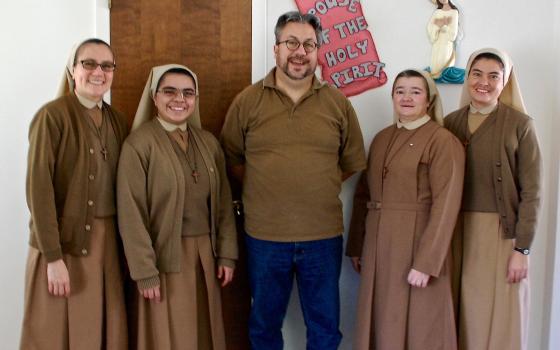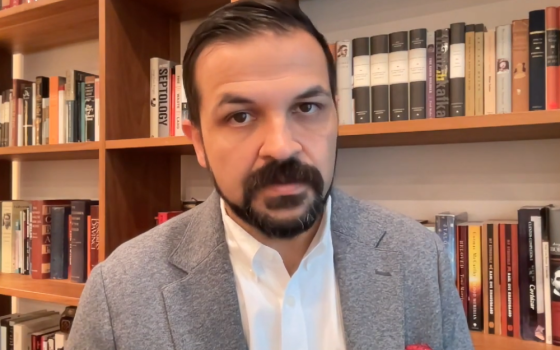
Nakhon Pathom, Thailand
Echoing the theme of AMOR XV, a gathering of women religious leaders in East Asia and Oceana, Infant Jesus Sister Maria Lau, from Singapore, Oct. 15 challenged some 115 participants to “to break out of their boundaries -- and move beyond them.”
She spoke at the outset of a nine-day conference at the Baan Phuwaan conference center, 30 miles outside of Bangkok, sponsored by AMOR, which stands for Asia-Oceania Meeting of Religious.
She encouraged the women to think anew and base their actions on the radical example of Jesus who broke through the boundaries of his time, and in the particular the way he dealt with women.
Papers and discussions at this AMOR gathering stem from reflections on the gospel story of Jesus’ encounter with the Syro-Phoenician Woman, the scriptural text aimed at anchoring the gathering.
Lau said the gospel stories of Jesus’ encounters with women reveal a pattern of empowerment. Jesus allowed women to be themselves, she said. “He gave women security and space to come forward,” she explained, citing the story of the way Jesus responded to the Canaanite woman who cried out to have mercy on her suffering daughter.
“Jesus broke through boundaries. The moment we identify a boundary around us we need to move beyond it. We need to do as Jesus did.” Her point was that many boundaries are false boundaries set up in one’s mind and often stem from a false perception or one's ego.
Her parallel message was that we need to live more inclusively, we need to listen to, and love those we ordinarily see as adversaries or enemies. Going beyond involves listening, loving and recognizing we live in abundance because all is a gift from God,” she said.
 Lau went on to cite a host of social challenges facing the world. She offered as examples the injustices of globalization, the destructive effects of commercialism and materialism, and the threat of global warming, as a few among many issues the world faces today.
Lau went on to cite a host of social challenges facing the world. She offered as examples the injustices of globalization, the destructive effects of commercialism and materialism, and the threat of global warming, as a few among many issues the world faces today.
Many of the women here are already focused on these issues, as conversations during the day’s conference breaks quickly revealed.
To cite just one example, one religious, living in rural Borneo, said she lives a life of modest witness as she tries to be in solidarity with the exploited people in rural Malaysia. She urged more attention to the plight of those in rural Borneo where, for example, the hunter-gatherer Penan tribe is battling to stop the destruction of its last remaining forests, and a way of life.
“Forests are being cleared for logging, robbing the Penan tribe of its means of survival.”
She said the ongoing vast deforestation in Borneo, while remote from the attention of most, is a critically important issue. “When our forests are gone, that’s it for the planet,” she said.
. On the first day of the gathering, Dr. Sumon Nakchalerm, a Thai medical doctor, gave a powerful and sobering talk, outlining the exploitation of the vulnerable and poor in Thai society.
On the first day of the gathering, Dr. Sumon Nakchalerm, a Thai medical doctor, gave a powerful and sobering talk, outlining the exploitation of the vulnerable and poor in Thai society.
She spoke about the devestating and growing effects of drug use in Thailand today, saying that some 600,000 are addicted, and 200,000 out of 300,000 in Thai prisons today are in for drug-related offenses.
 She spoke of the work being done to rescue children from foreign pedophiles and the challenge of sex trafficking. She spoke about the tens of thousands of Thai men who are migrating to find low-skilled contract work in Taiwan, South Korea, Israel, the United States and the Gulf states.
She spoke of the work being done to rescue children from foreign pedophiles and the challenge of sex trafficking. She spoke about the tens of thousands of Thai men who are migrating to find low-skilled contract work in Taiwan, South Korea, Israel, the United States and the Gulf states.
Acknowledging there are many serious challenges in Thai society, she ended her address by implored the women: “Don’t ever give up.”
This gathering involves sessions of prayer, reflection, social analysis and goal-setting. Out of these sessions the women will write a statement aimed at providing direction to women religious communities in the years ahead.
AMOR is a voluntary association, flexible in nature, and it meets every two to three years as a forum for women religious solidarity.
It was in the 1970s that women religious in Hong Kong first spoke out, saying their voices for justice and peace and other major issues concerning religious life and the world were not adequately being heard. They banded together and out of those efforts the AMOR seeds were sown.
Fox is NCR editor and can be reached at tfox@ncronline.org


